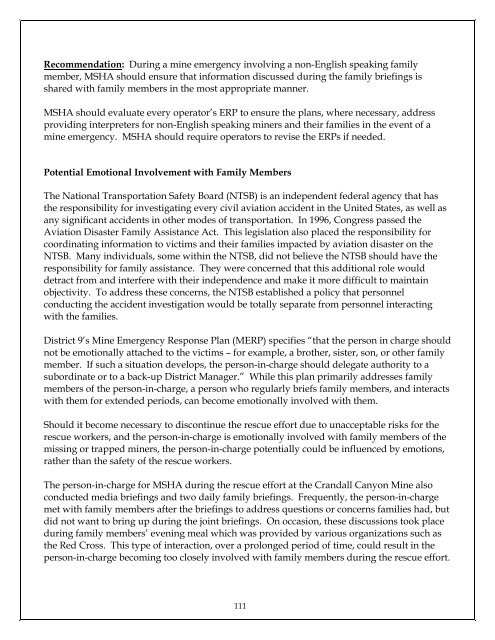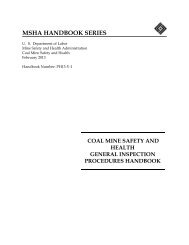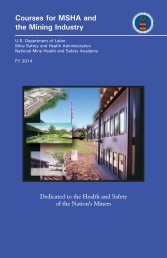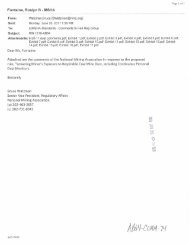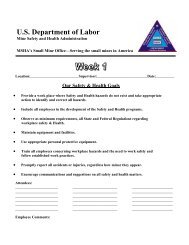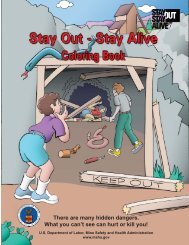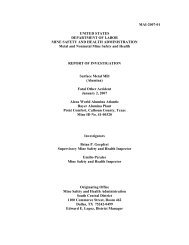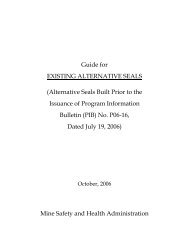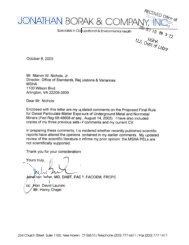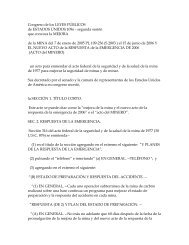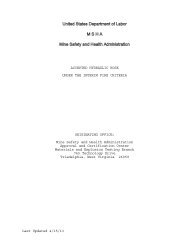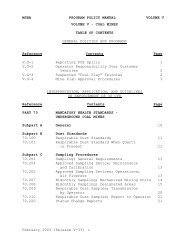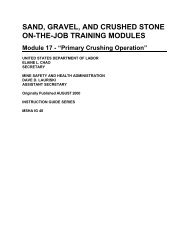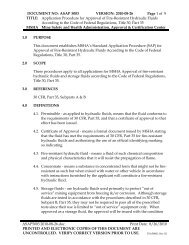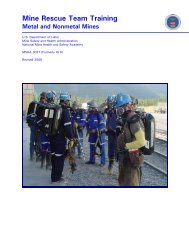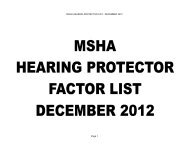Independent Review of MSHA's Actions at Crandall Canyon Mine
Independent Review of MSHA's Actions at Crandall Canyon Mine
Independent Review of MSHA's Actions at Crandall Canyon Mine
You also want an ePaper? Increase the reach of your titles
YUMPU automatically turns print PDFs into web optimized ePapers that Google loves.
Recommend<strong>at</strong>ion: During a mine emergency involving a non-English speaking family<br />
member, MSHA should ensure th<strong>at</strong> inform<strong>at</strong>ion discussed during the family briefings is<br />
shared with family members in the most appropri<strong>at</strong>e manner.<br />
MSHA should evalu<strong>at</strong>e every oper<strong>at</strong>or’s ERP to ensure the plans, where necessary, address<br />
providing interpreters for non-English speaking miners and their families in the event <strong>of</strong> a<br />
mine emergency. MSHA should require oper<strong>at</strong>ors to revise the ERPs if needed.<br />
Potential Emotional Involvement with Family Members<br />
The N<strong>at</strong>ional Transport<strong>at</strong>ion Safety Board (NTSB) is an independent federal agency th<strong>at</strong> has<br />
the responsibility for investig<strong>at</strong>ing every civil avi<strong>at</strong>ion accident in the United St<strong>at</strong>es, as well as<br />
any significant accidents in other modes <strong>of</strong> transport<strong>at</strong>ion. In 1996, Congress passed the<br />
Avi<strong>at</strong>ion Disaster Family Assistance Act. This legisl<strong>at</strong>ion also placed the responsibility for<br />
coordin<strong>at</strong>ing inform<strong>at</strong>ion to victims and their families impacted by avi<strong>at</strong>ion disaster on the<br />
NTSB. Many individuals, some within the NTSB, did not believe the NTSB should have the<br />
responsibility for family assistance. They were concerned th<strong>at</strong> this additional role would<br />
detract from and interfere with their independence and make it more difficult to maintain<br />
objectivity. To address these concerns, the NTSB established a policy th<strong>at</strong> personnel<br />
conducting the accident investig<strong>at</strong>ion would be totally separ<strong>at</strong>e from personnel interacting<br />
with the families.<br />
District 9’s <strong>Mine</strong> Emergency Response Plan (MERP) specifies “th<strong>at</strong> the person in charge should<br />
not be emotionally <strong>at</strong>tached to the victims – for example, a brother, sister, son, or other family<br />
member. If such a situ<strong>at</strong>ion develops, the person-in-charge should deleg<strong>at</strong>e authority to a<br />
subordin<strong>at</strong>e or to a back-up District Manager.” While this plan primarily addresses family<br />
members <strong>of</strong> the person-in-charge, a person who regularly briefs family members, and interacts<br />
with them for extended periods, can become emotionally involved with them.<br />
Should it become necessary to discontinue the rescue effort due to unacceptable risks for the<br />
rescue workers, and the person-in-charge is emotionally involved with family members <strong>of</strong> the<br />
missing or trapped miners, the person-in-charge potentially could be influenced by emotions,<br />
r<strong>at</strong>her than the safety <strong>of</strong> the rescue workers.<br />
The person-in-charge for MSHA during the rescue effort <strong>at</strong> the <strong>Crandall</strong> <strong>Canyon</strong> <strong>Mine</strong> also<br />
conducted media briefings and two daily family briefings. Frequently, the person-in-charge<br />
met with family members after the briefings to address questions or concerns families had, but<br />
did not want to bring up during the joint briefings. On occasion, these discussions took place<br />
during family members’ evening meal which was provided by various organiz<strong>at</strong>ions such as<br />
the Red Cross. This type <strong>of</strong> interaction, over a prolonged period <strong>of</strong> time, could result in the<br />
person-in-charge becoming too closely involved with family members during the rescue effort.<br />
111


